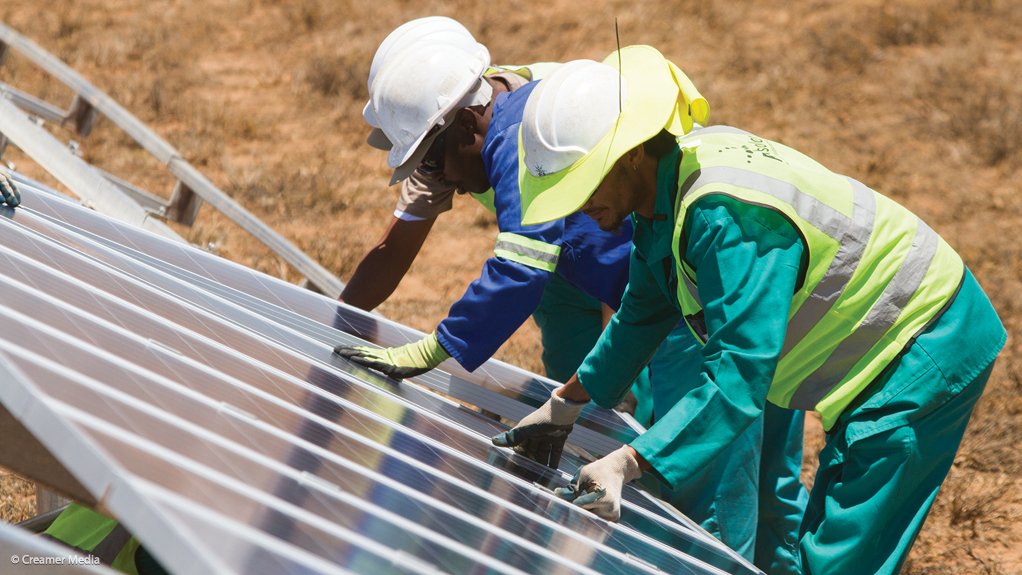South Africa aims to set up three JET-aligned skills development zones
Three Just Energy Transition (JET) skills development zones focusing on renewables and grids, electric vehicles and green hydrogen value chains are proposed for implementation under the larger JET Investment Plan (JET-IP), for which pledges of $11.5-billion have been made by several developed countries.
The zones will be anchored to specific educational institutions, most likely technical and vocational education and training (TVET) colleges selected for their proximity to the priority sectors, where education and training will be tailored towards a specific JET focus and where catalytic interventions will be undertaken and partnerships with business developed.
Joanne Yawitch of the JET Project Management Unit, which is located in the Presidency, reports that the development of JET-aligned skills has been identified as one of the key portfolios required to implement the JET-IP, approved by Cabinet in 2022.
The plan was then endorsed initially by France, Germany, the UK, the US and the European Union and later by several other countries, some of which have teamed up with the original International Partners Group, with others providing bilateral support.
The South African government’s JET-IP outlines the need for R1.5-trillion-worth of investment in the renewables, new energy vehicles and green hydrogen sectors between 2023 and 2027 to support the country meet its goal of reducing its carbon emissions to as close as possible to the lower band of the emissions range submitted to the United Nations Framework Convention on Climate Change, namely between 420- and 350-million tons by 2030.
The goal is currently likely to be missed given plans to extend the life of certain coal stations beyond their initial retirement dates, owing to a electricity supply deficit.
Speaking during a South African National Energy Association webinar, Yawitch said that skills had been identified as a key cross-cutting requirement for the JET-IP, the implementation of which was currently under way, following Cabinet’s endorsement of the implementation plan late last year.
Envisaged was a three-tier JET skills ecosystem, to be coordinated by a ‘JET Desk’ that would be set up either within the Department of Higher Education and Training or the Human Resource Development Council of South Africa.
The second tier would comprise a ‘National JET Skills Advisory Forum’, which would include representatives from government, civil society, the private sector, labour, higher-education institutions and TVET colleges to provide guidance regarding skills requirements and challenges.
The skills development zones would make up the third tier with each zone focusing on one of the three priorities of renewables and grids, electric vehicles and green hydrogen.
Without providing specific timeframes, Yawitch said the immediate priority was the establishment of the JET Skills Desk and the JET Skills Advisory Forum. In parallel, JET skills needs assessments would be undertaken for the three value chains.
Speaking on the same platform, Strategic Mindsets director Wendy Poulton confirmed that a South African Energy Skills Roadmap had already been considered in collaboration with the University of the Witwatersrand, which made several recommendations while also highlighting the need for flexibility amid several uncertainties.
It was recommended that an occupation and skills atlas be developed and skills planning be undertaken to ensure alignment between the needs of employers in the energy sector and education and training courses implemented at higher-education institutions.
Also being prioritised were specific interventions, including skills development programmes, in the Mpumalanga province, where workers and communities were especially vulnerable to the shift from coal to renewables.
Yawitch said a specific Mpumalanga portfolio was being created with its own secretariat and governing structure, workstreams and programmes.
Article Enquiry
Email Article
Save Article
Feedback
To advertise email advertising@creamermedia.co.za or click here
Comments
Press Office
Announcements
What's On
Subscribe to improve your user experience...
Option 1 (equivalent of R125 a month):
Receive a weekly copy of Creamer Media's Engineering News & Mining Weekly magazine
(print copy for those in South Africa and e-magazine for those outside of South Africa)
Receive daily email newsletters
Access to full search results
Access archive of magazine back copies
Access to Projects in Progress
Access to ONE Research Report of your choice in PDF format
Option 2 (equivalent of R375 a month):
All benefits from Option 1
PLUS
Access to Creamer Media's Research Channel Africa for ALL Research Reports, in PDF format, on various industrial and mining sectors
including Electricity; Water; Energy Transition; Hydrogen; Roads, Rail and Ports; Coal; Gold; Platinum; Battery Metals; etc.
Already a subscriber?
Forgotten your password?
Receive weekly copy of Creamer Media's Engineering News & Mining Weekly magazine (print copy for those in South Africa and e-magazine for those outside of South Africa)
➕
Recieve daily email newsletters
➕
Access to full search results
➕
Access archive of magazine back copies
➕
Access to Projects in Progress
➕
Access to ONE Research Report of your choice in PDF format
RESEARCH CHANNEL AFRICA
R4500 (equivalent of R375 a month)
SUBSCRIBEAll benefits from Option 1
➕
Access to Creamer Media's Research Channel Africa for ALL Research Reports on various industrial and mining sectors, in PDF format, including on:
Electricity
➕
Water
➕
Energy Transition
➕
Hydrogen
➕
Roads, Rail and Ports
➕
Coal
➕
Gold
➕
Platinum
➕
Battery Metals
➕
etc.
Receive all benefits from Option 1 or Option 2 delivered to numerous people at your company
➕
Multiple User names and Passwords for simultaneous log-ins
➕
Intranet integration access to all in your organisation





















